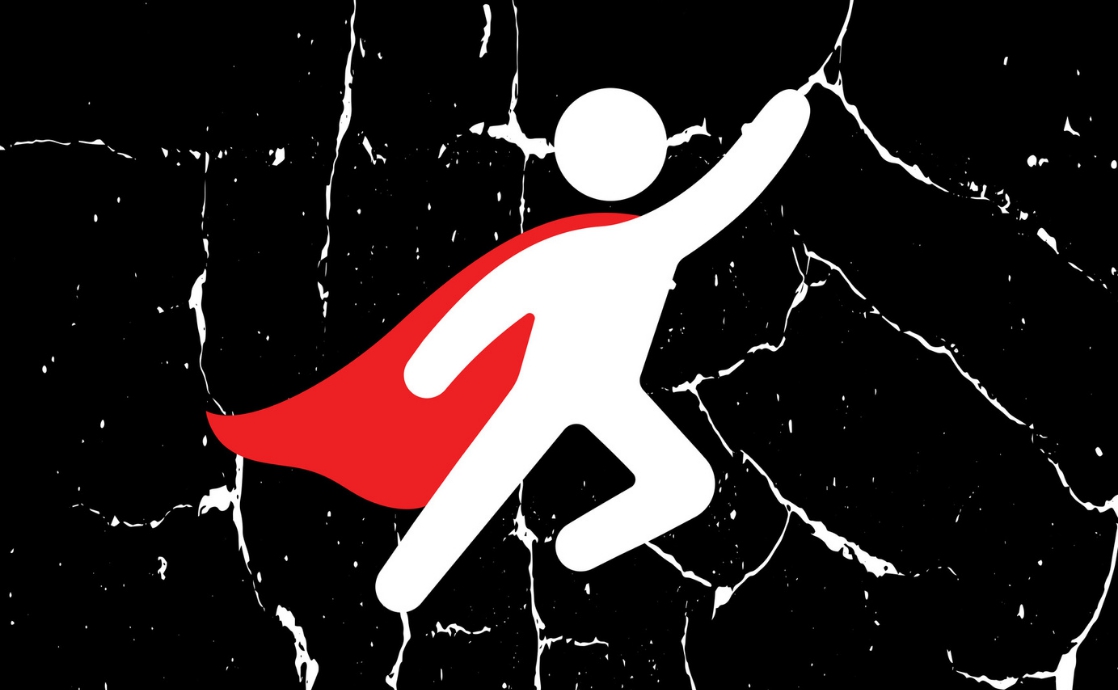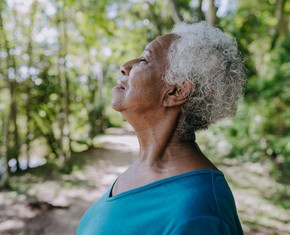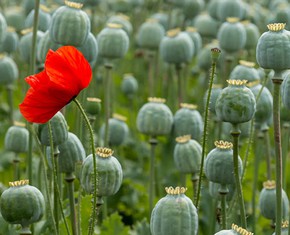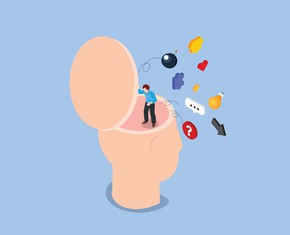The views expressed in our content reflect individual perspectives and do not represent the authoritative views of the Baha'i Faith.
I once met a guy who loved killing people. Things like that happen when you go to war – you encounter mass murderers, which military service in combat can foster and even encourage.
But you encounter real heroes, too.
Our culture likes to label all soldiers – at least our nation’s soldiers – as heroes. That cheapens the word by implying that just putting on a uniform and going through some rudimentary training makes people heroic. Trust me – it doesn’t.
RELATED: What War Did to Me – and to Us
Real Heroes: Exceedingly Rare
Real heroes, I learned after I put on a uniform and experienced the horrors of combat myself, are exceedingly rare. In battle, most people wind up scared to death, deeply frightened by the deadly intensity of the experience, and determined to do anything to save themselves. Even the most hardened soldiers experience that pervasive fear. I certainly did.
After many months of witnessing hostile engagements with enemy forces, I began to realize that the most heroic actions I witnessed in wartime had nothing to do with killing others. The most altruistic and admirable heroism I saw consistently came from the brave, death-defying exploits of medics, helicopter pilots, nurses, physicians, and trauma surgeons trying to rescue and revive the wounded. They had little or no role in combat itself – in fact, many, including the conscientious objector Baha’i infantry medics I knew, didn’t even carry a weapon. Instead, they dedicated themselves to saving life rather than taking it, and they did it day after day, risking their own lives in the service of humanity.
For me, that redefines the whole notion of heroism.
I knew one pilot of a medical evacuation helicopter – we called them medevacs or dustoffs – who saved the lives of literally hundreds of people by repeatedly risking his own life to make hot landings during active firefights. His name was John. He had a Southern drawl, an infectious laugh, and a fatalist’s acceptance of death. One day, after he overloaded his medevac chopper with eight wounded infantrymen in the middle of a hellacious battle and somehow got them all to safety, I counted 48 bullet holes in his un-armored helicopter. When I told him about it, John shrugged it off, grinning. “The mechanics’ll patch ‘em up,” he said, “and we live to fly another day.”
That’s what Baha’is in wartime do, too: serve their country, but carry no weapons. They work to save others. This passage from Baha’u’llah, the prophet and founder of the Baha’i Faith, explains why:
This people need no weapons of destruction, inasmuch as they have girded themselves to reconstruct the world. Their hosts are the hosts of goodly deeds, and their arms the arms of upright conduct, and their commander the fear of God. Blessed that one that judgeth with fairness. By the righteousness of God! Such hath been the patience, the calm, the resignation and contentment of this people that they have become the exponents of justice, and so great hath been their forbearance, that they have suffered themselves to be killed rather than kill …
In my experience, just a tiny handful of actual combatants exhibit great self-sacrifice and valor. For example: of the millions upon millions of Americans who have fought in the nation’s wars since 1861, only 3508 of them have ever been awarded the Medal of Honor, America’s highest recognition of gallantry.
Anyway, back to that young guy, who I met during the war in Vietnam. Pete (not his real name) had been a repeat-offender petty criminal during his early adolescence in New Jersey, and a judge, fearing that his offenses were escalating and tired of seeing him return to his courtroom over and over, finally gave him the choice of a long prison term or enlisting in the Army. In Vietnam, Pete learned that he loved shooting Viet Cong combatants – but because they were often elusive and hard to find in a guerilla war, and because they tended to shoot back, Pete began shooting farm animals, then firing into occupied buildings, and finally gunning down innocent civilians. I know of at least two people Pete murdered in cold blood – an unarmed rice farmer working in his paddy and an innocent woman walking down a road.
In spite of these crimes, or maybe because no one could prove that the people he killed weren’t combatants, the Army protected and promoted Pete, considering him an asset and an efficient eliminator of “the enemy.” I don’t know what eventually happened to him – when I left the war after my tour, I heard he was still there after signing up for his second yearlong hitch, still bloodthirsty and still looking for new victims. I’ve often wondered what someone like Pete might do if he did survive the war alive and return home – what such a terrible hunger for taking human life could eventually produce. We probably all know the answer to that question.
What Makes Someone Truly Heroic?
Defining what makes someone truly heroic, the Baha’i teachings offer us a very different analysis than the one we typically encounter in society today:
For centuries and cycles humanity has been engaged in war and conflict. At one time the pretext for war has been religion, at another time patriotism, racial prejudice, national politics, territorial conquest or commercial expansion; in brief, humanity has never been at peace during the period of known history. What blood has been shed! How many fathers have mourned the loss of sons; how many sons have wept for fathers, and mothers for dear ones! Human beings have been the food and targets of the battlefield, and everywhere warfare and strife have been the theme and burden of history. Ferocity has characterized men even more than animals. The lion, tiger, bear and wolf are ferocious because of their needs. Unless they are fierce, cruel and unrelenting, they will die of starvation. The lion cannot graze; its teeth are fitted only for food of flesh. This is also true of other wild animals. Ferocity is natural to them as their means of subsistence; but human ferocity proceeds from selfishness, greed and oppression. It springs from no natural necessity. Man needlessly kills a thousand fellow creatures, becomes a hero and is glorified through centuries of posterity. A great city is destroyed in one day by a commanding general. How ignorant, how inconsistent is humankind! If a man slays another man, we brand him as a murderer and criminal and sentence him to capital punishment, but if he kills one hundred thousand men, he is a military genius, a great celebrity, a Napoleon idolized by his nation. If a man steals one dollar, he is called a thief and put into prison; if he rapes and pillages an innocent country by military invasion, he is crowned a hero. How ignorant is humankind! Ferocity does not belong to the kingdom of man. It is the province of man to confer life, not death.
That passage, from a speech Abdu’l-Baha gave in Cleveland, Ohio in 1912, mounts a powerful anti-war argument. It also exalts the peacemakers, just as Christ and Buddha and Baha’u’llah did. Finally, it completely re-defines heroism.
A hero, from a Baha’i perspective, confers life and not death.
RELATED: The Dawn-Breakers Challenge: the History of Baha’i Heroes
Baha’is support a permanent end to war and the establishment of international peace, regulated, backed up, and enforced by a democratic system of global governance, as Abdu’l-Baha elucidated in this speech he gave at Stanford University:
Baha’u’llah especially emphasized international peace. He declared that all mankind is the one progeny of Adam and members of one great universal family. If the various races and distinct types of mankind had each proceeded from a different original paternity – in other words, if we had two or more Adams for our human fathers – there might be reasonable ground for difference and divergence in humanity today; but inasmuch as we belong to one progeny and one family, all names which seek to differentiate and distinguish mankind as Italian, German, French, Russian and so on are without significance and sanction. We are all human, all servants of God … Why, then, all these fallacious national and racial distinctions? These boundary lines and artificial barriers have been created by despots and conquerors who sought to attain dominion over mankind, thereby engendering patriotic feeling and rousing selfish devotion to merely local standards of government. As a rule they themselves enjoyed luxuries in palaces, surrounded by conditions of ease and affluence, while armies of soldiers, civilians and tillers of the soil fought and died at their command upon the field of battle, shedding their innocent blood for a delusion such as “we are Germans,” “our enemies are French,” etc., when, in reality, all are humankind, all belong to the one family … This prejudice or limited patriotism is prevalent throughout the world, while man is blind to patriotism in the larger sense which includes all races and native lands. From every real standpoint there must and should be peace among all nations.
Abdu’l-Baha and his father Baha’u’llah, the prophet and founder of the Baha’i Faith, said that we humans have the potential to descend, in our savagery and our destructiveness, even lower than the level of the most ferocious beasts. Anyone who has witnessed war will confirm that conclusion – and I saw it in vicious, conscience-less people like Pete. In my friend John, I saw the exact opposite.
So what can we do about this kind of wanton violence and killing when it afflicts people? How could we each best work to stop the horror of war and bring about international peace? In the next essay in this series, we’ll take a look at the great heroes of peace and see what they recommend.
You May Also Like
Comments

















where is part one? All of these topics I come across that talk about it being part of a series is frustrating because I cannot find the other parts easily. Is it a series by the same author? If so people should be able to easily find the other parts.